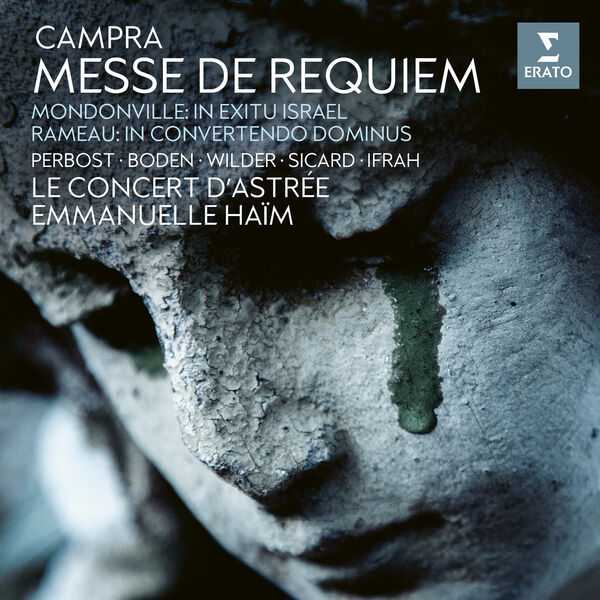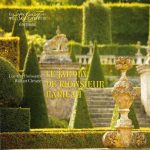

Composer: Andre Campra, Jean-Joseph Cassanea de Mondonville, Jean Philippe Rameau
Performer: Le Concert d’Astrée, Marie Perbost, Emmanuelle Ifrah, Samuel Boden, Zachary Wilder, Victor Sicard
Conductor: Emmanuelle Haïm
Format: FLAC (tracks)
Label: Warner
Catalogue: 5419750468
Release: 2023
Size: 950 MB
Recovery: +3%
Scan: yes
Campra: Messe de Requiem
01. I. Introit. Requiem
02. II. Kyrie eleison
03. III. Graduel
04. IV. (a) Offertoire. Trio. “Domine Jesu Christe”
05. IV. (b) Offertoire. Chœur. “Sed signifier sanctus Michael” – “Hostias et preces tibi Domine”
06. V. Sanctus
07. VI. Agnus Dei
08. VII. Communion
Rameau: In Convertendo, grand motet
09. I. Récit. “In convertendo Dominus”
10. II. Chœur. “Tunc repletum est”
11. III. Duo. “Magnificavit Dominus”
12. IV. Air. “Converte, Domine”
13. V. Air avec chœur. “Laudate nomen Dei”
14. VI. Trio. “Qui seminant”
15. VII. Chœur. “Euntes ibant et flebant”
Mondonville: In exitu Israel
16. I. (a) Introduction
17. I. (b) Chœur. “In exitu Israel”
18. II. Chœur. “Mare vidit”
19. III. Chœur. “Jordanis conversus est retrorsum”
20. IV. Air. “Montes exultaverunt ut arietes”
21. V. Chœur. “Quid est tibi, mare, quod fugisti?”
22. VI. Air avec Chœur. “A facie Domini”
23. VII. Air. “Qui timent Dominum”
24. VIII. Chœur. “Non mortui Iaudabunt te, Domine”
Emmanuelle Haïm, a Baroque expert “with an instinct for the crucial balance between energy and eloquence” (New York Times), directs the orchestra and singers of her ensemble Le Concert d’Astrée in choral works by three French composers of the 18th century: Rameau, Campra and Mondonville. The programme, illustrating the transition from sorrow to joy and from darkness into light, was recorded in the splendid Chapelle Royale of the palace of Versailles. When Haïm, Le Concert d’Astrée and the soloists who appear on this recording performed all three works in Dijon, where Rameau was born, Forum Opéra – noting that Haïm’s conducting “excelled as much through its vigour as its poetry” – described “a concert from which one emerged with a profound sense of happiness”.
The origins of André Campra’s Messe de Requiem are a bit murky, but it was probably written in 1695 as a memorial to the deceased Archbishop of Paris. That would make it one of the earlier French works to show the influence of the high Italian Baroque style. Most of the major Baroque specialist conductors have recorded the work, but this reading by Emmanuelle Haïm and Le Concert D’Astrée is among the strongest. It is a sizable group that does justice to the French court style and fills the Chapelle Royale at Versailles, where it was splendidly recorded during pauses in the renovation of the space. Campra’s mass shows a variety of influences, from a sober medieval sound based in plainchant to theatrical flavors from France and Italy. It is restrained but not especially dark. The Italian strain grows in the other two works on the album, both motets that are far from frequent in the repertory. Rameau’s rather dense but elegantly handled In convertendo Dominus, recounting the liberation of the Israelites from Babylon, makes a nice counterpoint to the Campra, setting the pattern of an emergence from darkness into light for the program as a whole. The pattern is completed by the lovely In exitu Israel of Jean-Joseph Mondonville, also on the theme of the Israelites (crossing the Red Sea this time), which is both virtuosic and joyous. Haïm’s enthusiasm for this repertory is palpable, and the musty, processional feel sometimes heard in performances of French Baroque court music is nowhere in evidence. It may have been surprising to see this rather obscure music show up on classical best-seller lists in the summer of 2023, but the reason is that the music is infectious indeed.



